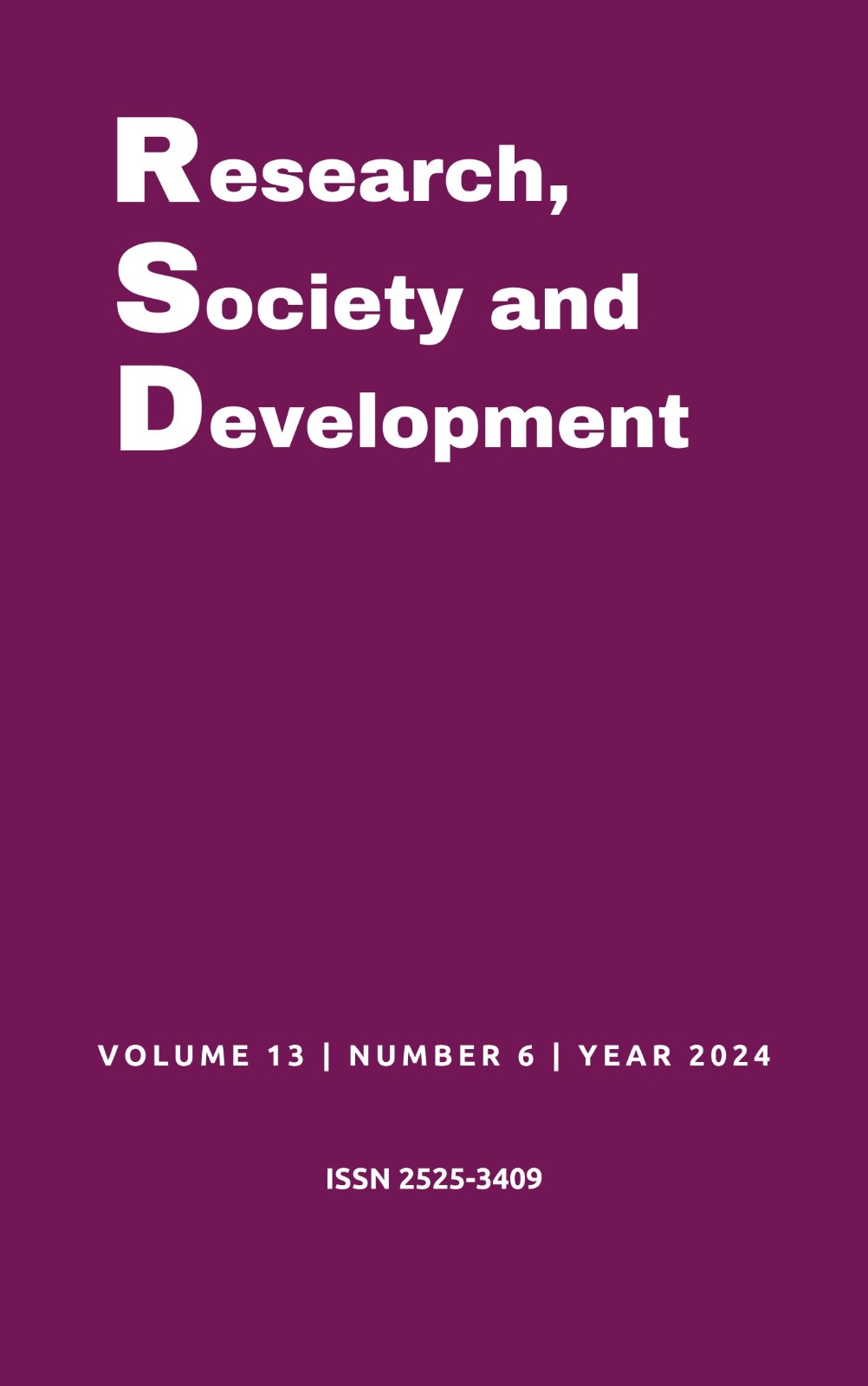The importance of nutrigenomics and nutrigenetics in chronic non-communicable diseases
DOI:
https://doi.org/10.33448/rsd-v13i6.46106Keywords:
Chronic non-communicable diseases, Nutrigenomics, Genes, Diet, Nutrients, Nutrigenetics, Ultra-processed, Foods.Abstract
Nutrigenomics is a multidisciplinary scientific field that studies the interactions between diet, nutrients, genes, and how these interactions influence health and relate to chronic non-communicable diseases. Nutrigenetics, in turn, is the study focused on analyzing individual genetic variations and how they lead to changes in a person's immune response, affecting the absorption and metabolism of nutrients. Therefore, the objective of this work is to report the importance of nutrigenomics and nutrigenetics in relation to chronic non-communicable diseases, bringing knowledge on this topic. This work is a literature review consulting the SCIELO, PERIÓDICO CAPES and GOOGLE ACADÊMICO databases over the last 10 years. Overweight and obesity are considered important risk factors for the development of chronic non-communicable diseases and are associated with increased intake of industrialized and ultra-processed foods, which can lead to significant changes in people's diet. Therefore, research also suggests that certain bioactive food ingredients have the potential to influence key cellular and molecular events that prevent cancer. Bioactive ingredients have the ability to prevent lipid oxidation and have antioxidant principles, which are claimed to play an extremely important role. Prevent cardiovascular diseases and cancer.
References
Cabral, P., et al. (2013). Padrão alimentar de risco para as doenças crônicas não transmissíveis e sua associação com a gordura corporal: uma revisão sistemática. Artigo ciência e saúde coletiva, 19(5), 1447-1458. https://doi.org/10.1590/1413-81232014195.14572013.
Eickemberg, M., et at. (2020). Obesidade abdominal no ELSA-Brasil: construção de padrão ouro latente e avaliação da acurácia de indicadores diagnósticos. Ciência & Saúde Coletiva, 25(8), 2985–2998. https://doi.org/10.1590/1413-81232020258.20992018
Ferreira, M. (2021). Precisamos falar sobre a nutrigenética. DB Molecular, https://www.dbmolecular.com.br/artigo/precisamos-falar-sobre-a-nutrigenetica.
Garcia, A., Sbrisse, E. & Godoy, I. (2023) A Nutrigenômica e Nutrigenética no Brasil. Revista Faculdades do Saber. 8 (18) https://rfs.emnuvens.com.br/rfs/issue/view/19.
Hermsdorff, H. (2019). Genômica nutricional. Editora Rubio.
Horne, J et al. (2020). Enhanced long-term dietary change and adherence in a nutrigenomics-guided lifestyle intervention compared to a population-based (GLB/DPP) lifestyle intervention for weight management: results from the NOW randomized controlled trial. NOW. BMJ FNutrition, Prevention & Health, 3 (1), 49,3(1):49-59. 10.1136/bmjnph-2020-000073.
INCA, Instituto Nacional de Câncer. (2022). O que é câncer? .https://www.gov.br/inca/pt-br/assuntos/cancer/o-que-e-cancer .
Jiménez, B, Elias, M, & Sanchez, R. (2018). Proyecto Nutrigenetica y Nutrigenomica . Laboratório clínico y biomédico.
Lima, L et al. (2017). Nutrigenômica do câncer de mama: fatores dietéticos e a expressão gênica :uma revisão sistemática. Rev. Interd. Ciên. Saúde, 4(2), 135-142. https://revistas.ufpi.br/index.php/rics/article/view/6728/0.
Nascimento, M., Souza, L, & Bezerra, K. (2021). Impacto da nutrigenômica na prevenção de doenças crônicas: uma revisão. Research, Society and Development, 10(16), e245101623681. http://dx.doi.org/10.33448/rsd-v10i16.23681.
Neitzel, B, Geus, L, Retondario, A. (2018). Fatores nutricionais associados a doenças crônicas não transmissíveis. Rev. Ciência. Ext, 14(1), p.9-25. https://ojs.unesp.br/index.php/revista_proex/article/view/1604/0.
Rother, E. T. (2007). Revisão sistemática x revisão narrativa. Acta paul. enferm.20(2). https://doi.org/10.1590/S0103-21002007000200001.
Roque, S et al. (2019). A nutrigenômica como método de prevenção e tratamento de doenças. Revista Desafios, 6(3). https://doi.org/10.20873/uftv6-7029.
Santos, L, Albuquerque, E. (2019). Nutrigenômica, Nutrigenética e suas aplicações. XI EPCC, Encontro Internacional de produção científica. http://rdu.unicesumar.edu.br/handle/123456789/3285.
Saraiva, A et al. (2020). Nutrigenética e nutrigenômica: conceitos e abordagens esquemáticas para o processo ensino-aprendizagem deste saber. Brazilian Journal of Development,Ramos, Viçosa-MG. 6(9), 69737–69751. https://doi.org/10.34117/bjdv6n9-427.
Schmidt, L, Solder,T , Benetti, F. (2019).Nutrigenômica como ferramenta preventiva de doenças crônicas não transmissíveis. Arq. Cienc. Saúde UNIPAR, 23(2), https://doi.org/10.25110/arqsaude.v23i2.2019.6386.
Soares, T, Souza, G, & Assis,W .(2020). A importância da nutrigenética e nutrigenômica em pacientes oncológicos . In: I Congresso Acadêmico Beneficente de Oncologia e Hematologia (CABOH). https://doity.com.br/anais/icaboh/trabalho/160258.
Trumé, C, Poll, F. (2018) Qualidade da dieta e fatores de risco para doenças crônicas. Perspectivas Online: Biológicas & Saúde, 8(26), 31-41. http://hdl.handle.net/11624/2118.
Valente, M et al. (2014). Nutrigenômica/nutrigenética na elucidação das doenças crônicas. HU. Revista Juiz de Fora, Minas Gerais, 40(4), 239 – 248. https://periodicos.ufjf.br/index.php/hurevista/article/view/2479.
Venâncio, D et al. (2022). Doenças crônicas não transmissíveis (DCNT): problemas resultantes desses agravos . Research, Society and Development, 11(14). http://dx.doi.org/10.33448/rsd-v11i14.36630
Downloads
Published
Issue
Section
License
Copyright (c) 2024 Ana Luísa Gama Salviano; Matheus Peixoto Bezerra; Dayanne da Costa Maynard

This work is licensed under a Creative Commons Attribution 4.0 International License.
Authors who publish with this journal agree to the following terms:
1) Authors retain copyright and grant the journal right of first publication with the work simultaneously licensed under a Creative Commons Attribution License that allows others to share the work with an acknowledgement of the work's authorship and initial publication in this journal.
2) Authors are able to enter into separate, additional contractual arrangements for the non-exclusive distribution of the journal's published version of the work (e.g., post it to an institutional repository or publish it in a book), with an acknowledgement of its initial publication in this journal.
3) Authors are permitted and encouraged to post their work online (e.g., in institutional repositories or on their website) prior to and during the submission process, as it can lead to productive exchanges, as well as earlier and greater citation of published work.


